Related Research Articles

Michael Laurence Nyman, CBE is an English composer, pianist, librettist, musicologist, and filmmaker. He is known for numerous film scores, and his multi-platinum soundtrack album to Jane Campion's The Piano. He has written a number of operas, including The Man Who Mistook His Wife for a Hat; Letters, Riddles and Writs; Noises, Sounds & Sweet Airs; Facing Goya; Man and Boy: Dada; Love Counts; and Sparkie: Cage and Beyond. He has written six concerti, five string quartets, and many other chamber works, many for his Michael Nyman Band. He is also a performing pianist. Nyman prefers to write opera over other forms of music.

The Life and Opinions of Tristram Shandy, Gentleman, also known as Tristram Shandy, is a novel by Laurence Sterne, inspired by Don Quixote. It was published in nine volumes, the first two appearing in 1759, and seven others following over the next seven years. It purports to be a biography of the eponymous character. Its style is marked by digression, double entendre, and graphic devices. The first edition was printed by Ann Ward on Coney Street, York.
John Harris Harbison is an American composer, known for his symphonies, operas, and large choral works.

A Cock and Bull Story is a 2005 British comedy film directed by Michael Winterbottom. It is a film-within-a-film, featuring Steve Coogan and Rob Brydon playing themselves as egotistical actors during the making of a screen adaptation of Laurence Sterne's 18th-century metafictional novel Tristram Shandy. Gillian Anderson and Keeley Hawes also play themselves in addition to their Tristram Shandy roles. Since the book is about a man attempting but failing to write his autobiography, the film takes the form of being about failing to make the film.

The violin, viola and cello were first built in the early 16th century, in Italy. The earliest evidence for their existence is in paintings by Gaudenzio Ferrari from the 1530s, though Ferrari's instruments had only three strings. The Académie musicale, a treatise written in 1556 by Philibert Jambe de Fer, gives a clear description of the violin family much as we know it today.
The Man Who Mistook His Wife for a Hat is a one-act chamber opera by Michael Nyman to an English-language libretto by Christopher Rawlence, adapted from the case study of the same name by Oliver Sacks by Nyman, Rawlence, and Michael Morris. It was first performed at the Institute of Contemporary Arts, London, on 27 October 1986.
Facing Goya (2000) is an opera in four acts by Michael Nyman on a libretto by Victoria Hardie. It is an expansion of their one-act opera called Vital Statistics from 1987, dealing with such subjects as physiognomy, eugenics, and its practitioners, and also incorporates a musical motif from Nyman's art song, "The Kiss", inspired by a Paul Richards painting. Nyman also considers the work thematically tied to his other works, The Man Who Mistook His Wife for a Hat, The Ogre, and Gattaca, though he does not quote any of these musically, save a very brief passage of the latter. It was premièred at the Auditorio de Galicia, Santiago de Compostela, Spain on 3 August 2000. The revision with the cast heard on the album premiered at the Badisches Staatstheater Karlsruhe, Germany, on October 19, 2002. Vital Statistics has been withdrawn. The Santiago version included more material from Vital Statistics. The opera was most recently performed at the 2014 Spoleto Festival USA, located in Charleston, South Carolina.
The Michael Nyman Band, formerly known as the Campiello Band, is a group formed as a street band for a 1976 production of Carlo Goldoni's 1756 play, Il Campiello directed by Bill Bryden at the Old Vic. The band did not wish to break up after the production ended, so its director, Michael Nyman, began composing music for the group to perform, beginning with "In Re Don Giovanni", written in 1977. Originally made up of old instruments such as rebecs, sackbuts and shawms alongside more modern instruments like the banjo and saxophone to produce as loud a sound as possible without amplification, it later switched to a fully amplified line-up of string quartet, double bass, clarinet, three saxophones, horn, trumpet, bass trombone, bass guitar, and piano. This lineup has been variously altered and augmented for some works.
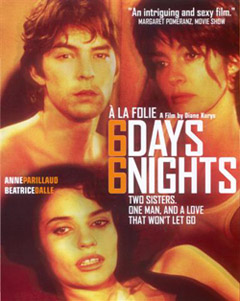
À la folie is a 1994 French drama film by Diane Kurys with music by Michael Nyman. It entered the competition at the 51st Venice International Film Festival.

The Michael Nyman Songbook is a collection of art songs by Michael Nyman based on texts by Paul Celan, Wolfgang Amadeus Mozart, William Shakespeare and Arthur Rimbaud. It was recorded as an album with Ute Lemper in 1991, and again as a concert film in 1992, under the direction of Volker Schlöndorff, again with Ute Lemper, though many of the musicians had changed. The songs have been recorded by others and as instrumentals, and are published by Chester Music. The album has been issued by both London Records and Argo Records, though the covers are the same except for the logo.
Love Counts is a 2005 opera in two acts by Michael Nyman to a libretto by Michael Hastings.

The Essential Michael Nyman Band is a studio album featuring a collection of music by Michael Nyman written for the films of Peter Greenaway and newly performed by the Michael Nyman Band. It is the seventeenth album release by Nyman. The album features liner notes by Annette Morreau, who describes the album as "a summation and digest of ten years of progress in the performance of music by a composer -- a composer with whom, so evidently, a group of friends and expert musicians intimately identify their total commitment, virtuosity, and joyous enthusiasm."
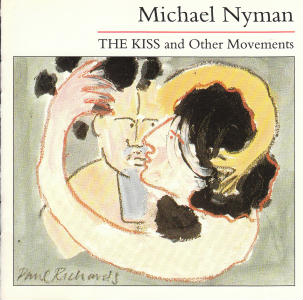
The Kiss and Other Movements is the sixth album release by Michael Nyman, and the fifth recording with the Michael Nyman Band. The title track is an "operatic duet" between Dagmar Krause and Omar Ebrahim, based on a painting of the same title by Paul Richards, which is depicted on the cover, and used in a video art project by Richards of the same name. The album includes music from Peter Greenaway's Making a Splash and 26 Bathrooms, an excerpt of Nyman's unfinished opera, Tristram Shandy, and a concert piece, "Tango Between the Lines".
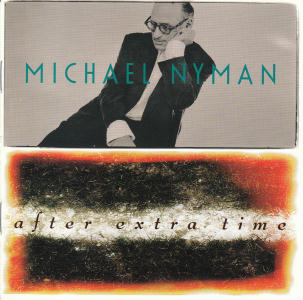
After Extra Time is a 1996 album by Michael Nyman with the Michael Nyman Band containing three tributes to Nyman's fandom of Association football: After Extra Time, the soundtrack to The Final Score, and Memorial. The latter is described as a remix, but is simply the 1992 recording from The Essential Michael Nyman Band. It was included in order to put it together with his two other football-inspired works. The album lists only three tracks, which has caused it to be erroneously reported that Memorial is track 3 and the others are all hidden tracks, but Memorial is track 26. Therefore, a track listing, as the individual portions of the pieces are not named, is not useful. The three pieces were recorded at separate times and thus have separate personnel lists.

And Do They Do/Zoo Caprices is the eighth album released by Michael Nyman and the fifth featuring the Michael Nyman Band. And Do They Do is a modern dance work commission by Siobhan Davies and The London Contemporary Dance Theatre, which premiered at Sadler's Wells Theatre on 25 November 1986. Zoo Caprices is a multi-stop violin solo for Alexander Balanescu based on the score for Peter Greenaway's film, A Zed & Two Noughts.
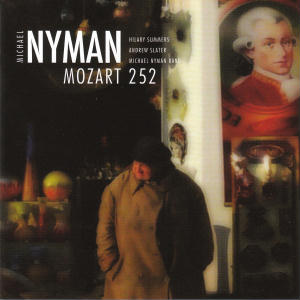
Mozart 252 is a 2008 album by Michael Nyman with the Michael Nyman Band, Hilary Summers, and Andrew Slater, celebrating the 250th anniversary of Wolfgang Amadeus Mozart's birth. Although "Revisiting the Don," one of only two newly written works on the album, was commissioned and performed in 2006, the album's title is a joke on its lateness as an album, released 252 years after Mozart's birth. The album also includes "In Re Don Giovanni," Nyman's first composition for the band, which is based on the first fifteen bars of "Madamina, il catalogo è questo" from Don Giovanni, six selections from Peter Greenaway's film, Drowning by Numbers, in which he was instructed to base the music on the slow movement of Mozart's Sinfonia Concertante K. 364, and two duets and an aria from Nyman's television opera, Letters, Riddles and Writs, in this recording featuring bass Andrew Slater as Leopold Mozart and contralto Hilary Summers as Wolfgang.
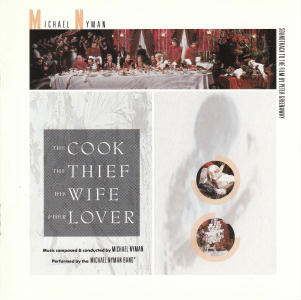
The Cook The Thief His Wife & Her Lover is the twelfth album release by Michael Nyman and the ninth to feature the Michael Nyman Band. It is the soundtrack to the eponymous film by Peter Greenaway. The album includes the first commercially released recording of Memorial, and this is the only piece discussed in the liner notes, to the point that the lyric sheet for "Miserere", the song which Pup the kitchen boy sings, is misidentified "Memorial." "Book Depository" is one of Nyman's many waltzes.
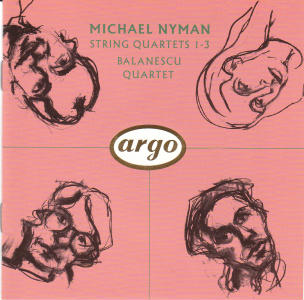
String Quartets 1–3 is a 1991 album by the Balanescu Quartet and the fifteenth release by Michael Nyman. It is the second album of his music on which he did not perform or conduct, though he does provide liner notes. String Quartet No. 3 is built out of Out of the Ruins and became a fixture in numerous Nyman film scores in the 1990s.

The Piano Concerto/MGV is the 23rd album by Michael Nyman, released in 1994. It contains two compositions, The Piano Concerto and MGV. The first is performed by Kathryn Stott and the Royal Liverpool Philharmonic Orchestra conducted by Michael Nyman, and the second is performed by the Michael Nyman Band and Orchestra with Michael Nyman at the piano.

Juana Inés, is a Mexican television series co-produced by Canal Once and Bravo Films. The series is created by Patricia Arriaga Jordán, based on the life and work of Sor Juana Inés de la Cruz. The series consists of seven episodes and one season. Series production began on November 4, 2015 in the Ex-Hacienda Santa Mónica, in Mexico City. The series was released on 26 March 2016.
References
- ↑ "Home".
- ↑ Michael Nyman. Drowning by Numbers . Liner Notes. Virgin Records. 1988
- ↑ Nyman, Michael. The Kiss and Other Movements. Liner notes. Editions EG, 1985.
- ↑ "Home".